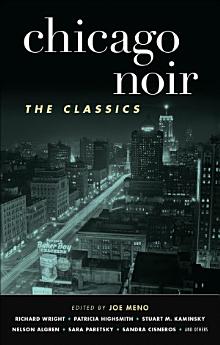Chicago Noir: The Classics
Acerca de este libro electrónico
"In this superior entry in Akashic's noir series, Meno offers nearly a century of Chicago crime fiction. . . . Familiar bylines abound: Max Allan Collins, Richard Wright, Nelson Algren, Sherwood Anderson, Fredric Brown, Patricia Highsmith (with an excerpt from her novel The Price of Salt), Stewart M. Kaminsky, Sara Paretsky. Others may be less familiar to mystery specialists, but all turn in impressive performances." — Publishers Weekly, Starred Review
"Richard Wright, Nelson Algren, and Sandra Cisneros are not crime-fiction writers, and yet their Chicago certainly embodies the individual-crushing ethos endemic to noir. Meno also includes stories from writers who could easily have been overlooked (Percy Spurlark Parker, Hugh Holton) to ensure that diverse voices, and neighborhoods, are represented. Add in smart and essential choices from Fredric Brown, Sara Paretsky, and Stuart Kaminsky, and you have not an anthology not for crime-fiction purists, perhaps, but a thought-provoking document all the same." — Booklist
Although Los Angeles may be considered the most quintessentially "noir" American city, this volume reveals that pound-for-pound, Chicago has historically been able to stand up to any other metropolis in the noir arena.
Classic reprints from: Harry Stephen Keeler, Sherwood Anderson, Max Allan Collins, Richard Wright, Nelson Algren, Fredric Brown, Patricia Highsmith, Barry Gifford, Stuart M. Kaminsky, Libby Fischer Hellmann, Sara Paretsky, Percy Spurlark Parker, Sandra Cisneros, Hugh Holton, and Stuart Dybek.
From the introduction by Joe Meno:
More corrupt than New York, less glamorous than LA, Chicago has more murders per capita than any other city its size. With its sleek skyscrapers bisecting the fading sky like an unspoken threat, Chicago is the closest metropolis to the mythical city of shadows as first described in the work of Chandler, Hammett, and Cain. Only in Chicago do instituted color lines offer generation after generation of poverty and violence, only in Chicago do the majority of governors do prison time, only in Chicago do the dead actually vote twice.
Chicago—more than the metropolis that gave the world Al Capone, the Saint Valentine's Day Massacre, the death of John Dillinger, the crimes of Leopold and Loeb, the horrors of John Wayne Gacy, the unprecedented institutional corruption of so many recent public officials, more than the birthplace of Raymond Chandler—is a city of darkness. This darkness is not an act of over-imagination. It's the unadulterated truth. It's a pointed though necessary reminder of the grave tragedies of the past and the failed possibilities of the present. Fifty years in the future, I hope these stories are read only as fiction, as somewhat distant fantasy. Here's hoping for some light.







